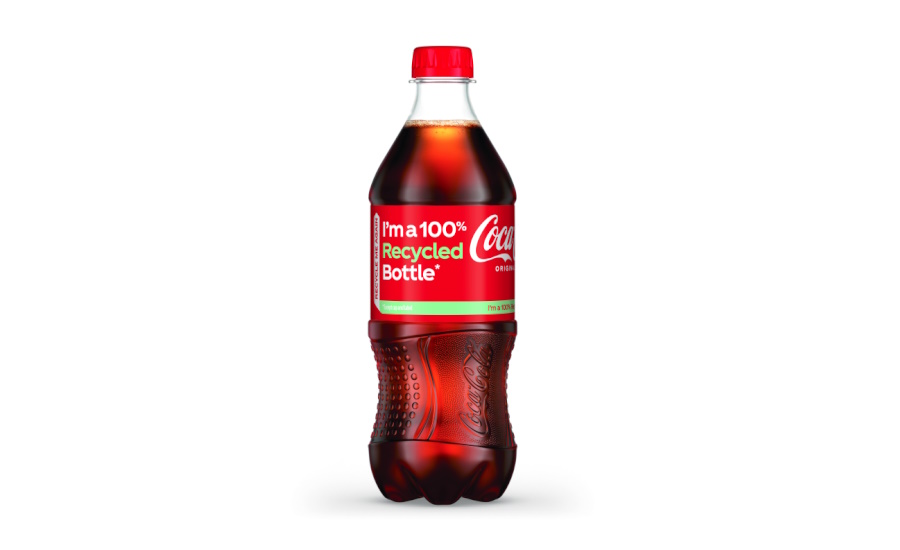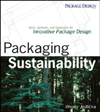Coca-Cola Announces Packaging Waste Reduction Goals; Some Groups Not Impressed

The Coca-Cola Company's 100% rPET bottle. (Courtesy of The Coca-Cola Company)
The Coca‑Cola Company on Monday announced updated voluntary environmental goals.
With regard to packaging, the company aims to use 35% to 40% recycled material* in primary packaging (plastic, glass and aluminum), including increasing recycled plastic use to 30% to 35% globally.
Another goal is to help ensure the collection of 70% to 75% of the equivalent number of bottles and cans introduced into the market annually.
The company offers beverages in a variety of packaging formats – glass and plastic bottles, aluminum cans and refillable packaging. “Each option can play a role in helping reduce packaging waste and emissions,” the company says.
The company is focusing its efforts to use more recycled material in primary packaging and supporting collection rates, both of which require enabling policies and the growth of collection infrastructure. The company intends to continue to invest in refillable packaging where infrastructure already exists. The Coca‑Cola system aims to focus on measurable and interconnected actions under two pillars: Design and Partner to Collect.
Design
The company is focused on ensuring that its primary packaging is recyclable. Almost all (more than 95%)** of the company’s primary consumer packaging is designed to be recycled, and it is working to resolve the remaining packages.
The use of recycled content in primary packaging can help reduce the company’s emissions. This effort, combined with innovations such as lightweighting, can avoid the additional use of virgin plastic. Costs, quality and scaling innovation are dynamic external factors that will affect implementation.
Partner to Collect
“The collection and recycling of beverage packaging remains challenging, as every state and country has unique systems, infrastructure, regulatory environments and sets of consumer behaviors,” the company says. “Collective action is needed to support packaging collection infrastructure and policies. The company will continue to focus on increased advocacy for well-designed collection systems, as these are often the most efficient ways to improve packaging collection rates.”
If the company reaches its 70% to 75% collection rate ambition, it intends to continue working to further increase collection over the long term. “The company also intends to invest to expand the use of refillable packaging in markets where infrastructure is in place to support this important part of the company’s portfolio,” the company says.
Oceana’s Response
Oceana is the largest international advocacy organization dedicated solely to ocean conservation.
In response to Monday’s announcement, the group was critical of Coca-Cola for ending the following goals included in the company’s 2023 Environmental Update:
- “Have at least 25% of our beverages worldwide by volume sold in refillable/returnable glass or plastic bottles or in fountain dispensers with reusable packaging by 2030”
- “Reduce our use of virgin plastic derived from non-renewable sources by a cumulative 3 million metric tons from 2020 to 2025.”
In response to this development, Oceana released the following statement from Matt Littlejohn, Senior Vice President of Strategic Initiatives:
“Coca-Cola’s decision to double down on single-use plastic – by killing its goals to reduce virgin plastic and to increase reusable packaging – is short-sighted, irresponsible, and worthy of widespread condemnation by its customers, its employees, its investors, and governments worried about the impact of plastics on our oceans and health.
“Coca-Cola’s new policy makes it likely that many more billions of single-use plastic bottles and cups will continue to flood into our waterways and seas. Oceana estimates that if Coca-Cola met its commitment to reach 25% reusable packaging by 2030 (up from its current share of 14%) the company could avoid producing the equivalent of over 100 billion 500ml single-use plastic bottles and cups and ensure that approximately 8.5 to 14.7 billion plastic bottles and cups could be prevented from reaching our waterways and seas.
“The company’s new and weak recycling-related pledges won’t make a dent in its overall plastic use. As the number one plastic polluter in the world – according to the Break Free From Plastic Brand Audit – Coca-Cola has a responsibility to take real ownership over the waste and pollution it creates. Instead, it is kicking the plastic bottle down the road and into the sea – again. Coca-Cola’s investors and governments around the world should take notice and take steps to hold the company accountable.”
* Coca-Cola will continue to comply with local regulations, including where higher percentages of recycled content are required.
** Excludes cups, which are purchased by customers and outside of the company’s control.
Looking for a reprint of this article?
From high-res PDFs to custom plaques, order your copy today!









